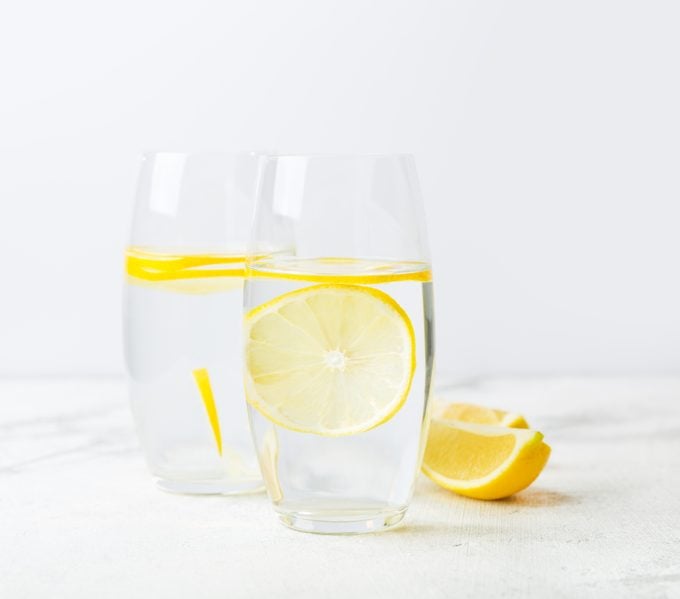Can You Drink Lemon Water While Fasting?
Updated: Jul. 21, 2023
Intermittent fasting is one of the most popular diet trends. Here's how lemon water can affect your fast.
What is intermittent fasting?
While many diets like Whole 30, keto, or the macro diet dictate what to eat and drink, intermittent fasting is all about when you eat and drink. Many celebrities rave about it, and it was found to be the most popular diet of 2020, according to a June survey by the International Food and Information Council (IFIC).
“The primary types of intermittent fasting are time-restricted options, say, having a window when you can eat for eight or 10 hours a day followed by fasting for 14 to 16 hours,” explains Julie Upton, RD, co-founder of the nutrition news company Appetite for Health in San Francisco. “Other intermittent fasting programs have people eat normally for five days and then fast for two days each week.”
Although your calories are limited during those fasting windows, you can drink as much water or other non-calorie beverages as you want. This can include lemon water.
These are some of the most common styles of intermittent fasting:
-
Time-restricted eating. When you follow the most popular and “most sustainable of all intermittent fasting plans,” according to Upton, you eat within a set window every day of the week. Often, this is in a 16:8 format (eat within an eight-hour window, say 11 a.m. to 7 p.m., and fast for the other 16 hours).
-
24-hour fast. One or two days per week, eat nothing for a 24-hour window. Eat normally the other five or six days.
-
Alternate day fasting. Every other day, eat about 500 calories. Eat normally on the alternate days.
-
Twice-a-week or 5:2 fasting. Eat about 500 calories on two days of the week. Eat normally on the other five days.
-
The Warrior Diet. Eat within a four-hour window each day.

Can you drink lemon water while fasting?
Because it is calorie- and macronutrient-free, water does not raise insulin levels—and therefore, does not break a fast, says Leigh Merotto, RD, a Toronto-based registered dietitian with a focus on metabolic health, digestion/gut health and sports nutrition. Feel free to drink as much plain water as you like to stay hydrated and promote digestive health during eating and fasting periods.
So how about lemon water? We’re not talking about sweetened lemonade, or lemon-flavored caloric waters, or sports drinks you can find in a supermarket drink aisle. Here, we’re referring to water spiked with lemon juice.
“Lemon juice has relatively no carbs compared to other fruit juices, so it can be used as a way to flavor water without breaking a fast,” Merotto says.
Stick to about a quarter of a lemon squeezed into 8 ounces of water, Bates says, to ensure you’re keeping the calories and carbs low enough to not raise insulin.
According to the USDA’s FoodData Nutrition Database, the juice from a quarter of a lemon contains approximately:
-
3 calories
-
0.03 grams of fat
-
0.04 grams of protein
-
0.8 grams of carbohydrates
- 0.3 grams of sugar
Potential benefits and risks of drinking lemon water while fasting
Most nutrition experts agree that lemon water is close enough to no calories and carbs and won’t kick the body out of the fat-burning ketosis phase. As long as you don’t consume more than 3 ounces of lemon juice—which would be one wildly-tart glass of lemon water—your metabolism likely won’t notice the small amount of natural fruit sugars in the lemon juice.
While it doesn’t break the fast or offer any macronutrients worth noting, lemon water does offer some benefits. It’s potent in vitamin C, which offers antioxidant, anti-inflammatory, and skin-boosting properties, according to a 2017 study in the journal Nutrients.
It will also likely make the water feel more satisfying and appealing than plain tap or bottled, which might inspire you to drink more—and stay better hydrated and feel slightly more full. The citric acid that’s found in lemons can help reduce the risk for calcium build-up that may lead to kidney stones.
Lemon juice can be acidic and drinking large quantities can potentially impact the enamel of the teeth, but as long as you’re diluting it in water, there’s usually no harm in flavoring some of your water with a splash of lemon juice while fasting or otherwise. (Here are other health habits that can be bad for your teeth.)
Counting calories during intermittent fasting
Non-calorie drinks are key on fasting days. Your total calorie count depends on which intermittent fasting style you follow. On non-fasting days, the calorie quota is totally up to you.
On fasting days or during fasting windows, most intermittent fasting followers aim to eat between zero and about 500 calories, or about 25 percent of your normal calorie intake. (To put this into perspective, 500 calories is equivalent to 2 eggs, 1 cup of blueberries, 1 ounce of almonds, and 1 cup of carrots with 2 tablespoons of hummus.)
While following an intermittent fasting diet, you can usually use those 500 calories on whatever foods or drinks you like.
Fasting for weight loss
There are several proven benefits of intermittent fasting ranging from better sleep to lower cardiovascular risk, but most people turn to fasting for weight loss. A 2018 review in the JBI Database of Systematic Reviews and Implementation Reports found that intermittent fasting can help with short-term weight loss in overweight and obese adults.
Few current studies, however, prove that fasting is better for weight loss than other calorie-controlled diets.
Eating earlier in the day appears to offer the biggest body benefits, including lower blood pressure and less hunger since it’s more aligned with natural circadian rhythms, a Cell Metabolism study suggests. Overall, results are temporary, meaning that intermittent fasting is only as beneficial as how long you can stick to it.
There’s also a September study published in JAMA Internal Medicine that found adults who followed the 16:8 time-restricted diet for 3 months lost two to three-and-a-half pounds, slightly more than their control group counterparts.
However, most of that weight was lean mass, including muscle. This means that strength training and focusing on the quality of your calories is vital to preserve muscle mass (for strength and to keep your metabolism humming.)
It’s not safe to stop eating for 24 hours, or even 14 hours for some people. Those who are active, pregnant, lactating, are on medication, have diabetes, or have a history of eating disorders should skip it.
They should only consider trying intermittent fasting under the close supervision of an experienced dietitian or doctor, advises Merotto.























